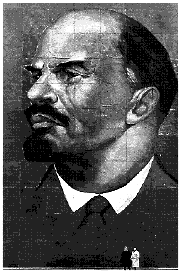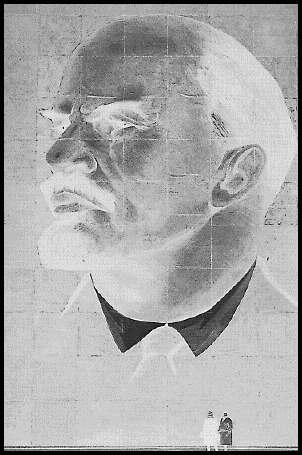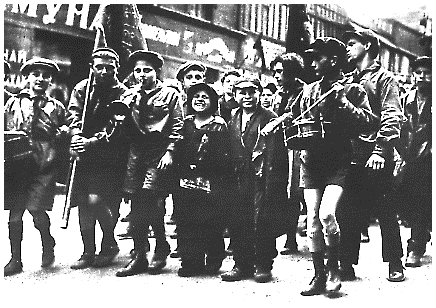Stalin
Eric Hobsbawm

In many ways Stalin, tiny,** cautious, insecure, cruel, nocturnal and endlessly suspicious, seems a figure out of Suetonius' Lives of the Caesars rather than out of modern politics. Outwardly unimpressive and indeed forgettable, "a grey blur" as a contemporary observer called him in 1917, he conciliated and manoeuvred where he had to, until he reached the top; but, of course, his very considerable gifts had got him close to the top even before the revolution. He was a member of the first government after the revolutionary government as Commissar for nationalities. When he finally became the unchallenged leader of the party and (in effect) of the state, he lacked the palpable sense of personal destiny, the charisma and self-confidence which made Hitler the founder and accepted master of his party and kept his entourage loyal to him without coercion. Stalin ruled his party, as everything else within reach of his reach, by terror and fear.
In turning himself into something like a secular Tsar, defender of the secular Orthodox faith, the body of whose founder, transformed into a secular saint, awaited the pilgrims outside the Kremlin, Stalin showed a sound sense of public relations. For a collection of peasant and animal-herding peoples mentally living in the Western equivalent of the eleventh century, this was almost certainly the most effective way of establishing the legitimacy of the new regime, just as the simple, unqualified, dogmatic catechisms to which he reduced "Marxism-Leninism" were ideal for introducing ideas to the first generation of literates.***
Nor can his terror simply be seen as the assertion of a tyrant's unlimited personal power. There is no doubt he enjoyed that power, the fear that he inspired, the ability to give life or death, just as there is no doubt that he was quite indifferent to the material rewards that someone in his position could command. Yet, whatever his personal psychological kinks, Stalin's terror was, in theory, as rationally instrumental a tactic as was his caution where he lacked control. Both, in fact, were based on the principle of avoiding risks, which, in turn, reflected that very lack of confidence in his ability to assess situations ("to make a Marxist analysis," in the Bolshevik jargon) which had distinguished Lenin. His terrifying career makes no sense except as a stubborn, unbroken, pursuit of that utopian aim of a communist society to whose reassertion he devoted the last of his publications, a few months before his death.
Power in the Soviet Union was all that the Bolsheviks had gained by the October Revolution. Power was the only tool they could wield to change society. This was beset by constant, and in one way or another, constantly renewed difficulties. (This is the meaning of Stalin's other- wise absurd thesis that the class struggle would become more intense decades after "the proletariat had taken power.") Only the determination to use power consistently and ruthlessly to eliminate all possible obstacles to the process could guarantee eventual success.
Three things drove a policy based on this assumption towards a murderous absurdity.
 First, Stalin's belief that in the last analysis only he knew the way forward and was sufficiently determined to pursue it. Plenty of politicians and generals have this sense of indispensability, but only those with absolute power are in a position to compel others to share this belief. Thus the great purges of the 1930s which, unlike earlier forms of terror, were directed against the party itself and especially its leadership, began after many hardened Bolsheviks, including those who had supported him against the various oppositions of the 1920s and genuinely backed the Great Leap Forward of Collectivization and Five-Year Plan, found the ruthless cruelties of the period and the sacrifices it imposed, more than they would willingly accept. No doubt many of them remembered Lenin's refusal to back Stalin as his successor because of his excessive brutality. The seventeenth Congress of the Communist Party of the Soviet Union revealed a substantial opposition to him. Whether it actually constituted a threat to his power we shall never know, for between 1934 and 1939 four or five million party members and officials were arrested on political grounds, four or five hundred thousand of them were executed without trial, and the next (eighteenth) Party Congress which met in the spring of 1939, contained a bare thirty-seven survivors of the 1827 delegates who had been present at the seventeenth in 1934.
First, Stalin's belief that in the last analysis only he knew the way forward and was sufficiently determined to pursue it. Plenty of politicians and generals have this sense of indispensability, but only those with absolute power are in a position to compel others to share this belief. Thus the great purges of the 1930s which, unlike earlier forms of terror, were directed against the party itself and especially its leadership, began after many hardened Bolsheviks, including those who had supported him against the various oppositions of the 1920s and genuinely backed the Great Leap Forward of Collectivization and Five-Year Plan, found the ruthless cruelties of the period and the sacrifices it imposed, more than they would willingly accept. No doubt many of them remembered Lenin's refusal to back Stalin as his successor because of his excessive brutality. The seventeenth Congress of the Communist Party of the Soviet Union revealed a substantial opposition to him. Whether it actually constituted a threat to his power we shall never know, for between 1934 and 1939 four or five million party members and officials were arrested on political grounds, four or five hundred thousand of them were executed without trial, and the next (eighteenth) Party Congress which met in the spring of 1939, contained a bare thirty-seven survivors of the 1827 delegates who had been present at the seventeenth in 1934.
What gave this terror an unprecedented inhumanity was that it recognized no conventional or other limits. It was not so much the belief that a great end justifies all the means necessary to achieve it (though it is possible that this was Mao Tse-tung's belief), or even the belief that the sacrifices imposed on the present generation, however large, are as nothing to the benefits which will be reaped by the endless generations of the future. It was the application of the principle of total war to all times. Leninism, perhaps because of the powerful strain of voluntarism which made other Marxists distrust Lenin as a "Blanquist" or "Jacobin," thought essentially in military terms as his own admiration for Clausewitz would indicate, even if the entire vocabulary of Bolshevik politics did not bear witness to it. "Who whom?" was Lenin's basic maxim: the struggle as a zero-sum game in which the winner took, the loser lost, all. As we know, even the liberal states waged both world wars in this spirit, and recognized absolutely no limit on the suffering they were prepared to impose on the population of "the enemy," and, in the First World War, even on their own armed forces. Indeed, even the victimization of entire blocs of people defined on a priori grounds, became part of warfare: such as the internment during the Second World War of all U.S. citizens of Japanese origin or of all resident Germans and Austrians in Britain on the grounds that they might contain some potential agents of the enemy. This was part of that relapse of nineteenth-century civil progress into a renaissance of barbarism, which runs like a dark thread through this book.

-
* The similarity with monarchy is indicated by the tendency of some such states actually to move in the direction of hereditary succession, a development which would have seemed absurdly unthinkable to earlier socialists and communists. North Korea and Romania were two cases in point.
** The present writer, who saw Stalin's embalmed body in the Red Square mausoleum before it was removed in 1961 can remember the shock of seeing a man so tiny and yet so all-powerful. Significantly, all films and photographs concealed the fact that he was only 5' 3" tall.
*** And not only these. The 1939 Short History of the Soviet Communist Party, whatever its lies and intellectual limitations, was pedadogically a masterly text.
A History of the World, 1914 - 1991
(©1999, Vintage)